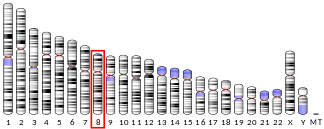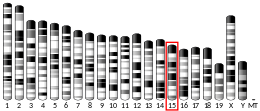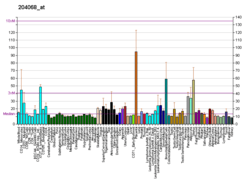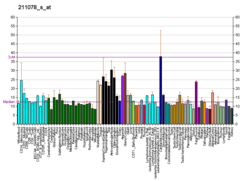STK3
Serine/threonine-protein kinase 3 is an enzyme that in humans is encoded by the STK3 gene.[5][6]
Protein kinase activation is a frequent response of cells to treatment with growth factors, chemicals, heat shock, or apoptosis-inducing agents. This protein kinase activation presumably allows cells to resist unfavorable environmental conditions. The yeast 'sterile 20' (Ste20) kinase acts upstream of the mitogen-activated protein kinase (MAPK) cascade that is activated under a variety of stress conditions. MST2 was first identified as a kinase that resembles budding yeast Ste20 (Creasy and Chernoff, 1996) and later as a kinase that is activated by the proapoptotic agents straurosporine and FAS ligand (MIM 134638) (Taylor et al., 1996; Lee et al., 2001).[supplied by OMIM][6]
References
- 1 2 3 GRCh38: Ensembl release 89: ENSG00000104375 - Ensembl, May 2017
- 1 2 3 GRCm38: Ensembl release 89: ENSMUSG00000022329 - Ensembl, May 2017
- ↑ "Human PubMed Reference:".
- ↑ "Mouse PubMed Reference:".
- ↑ Taylor LK, Wang HC, Erikson RL (Nov 1996). "Newly identified stress-responsive protein kinases, Krs-1 and Krs-2". Proc Natl Acad Sci U S A. 93 (19): 10099–104. doi:10.1073/pnas.93.19.10099. PMC 38343. PMID 8816758.
- 1 2 "Entrez Gene: STK3 serine/threonine kinase 3 (STE20 homolog, yeast)".
Further reading
- Creasy CL, Chernoff J (1995). "Cloning and characterization of a human protein kinase with homology to Ste20". J. Biol. Chem. 270 (37): 21695–700. doi:10.1074/jbc.270.37.21695. PMID 7665586.
- Schultz SJ, Nigg EA (1994). "Identification of 21 novel human protein kinases, including 3 members of a family related to the cell cycle regulator nimA of Aspergillus nidulans". Cell Growth Differ. 4 (10): 821–30. PMID 8274451.
- Creasy CL, Chernoff J (1996). "Cloning and characterization of a member of the MST subfamily of Ste20-like kinases". Gene. 167 (1–2): 303–6. doi:10.1016/0378-1119(95)00653-2. PMID 8566796.
- Bren A, Welch M, Blat Y, Eisenbach M (1996). "Signal termination in bacterial chemotaxis: CheZ mediates dephosphorylation of free rather than switch-bound CheY". Proc. Natl. Acad. Sci. U.S.A. 93 (19): 10090–3. doi:10.1073/pnas.93.19.10090. PMC 38341. PMID 8816756.
- Wang HC, Fecteau KA (2000). "Detection of a novel quiescence-dependent protein kinase". J. Biol. Chem. 275 (33): 25850–7. doi:10.1074/jbc.M000818200. PMID 10840030.
- Lee KK, Ohyama T, Yajima N, et al. (2001). "MST, a physiological caspase substrate, highly sensitizes apoptosis both upstream and downstream of caspase activation". J. Biol. Chem. 276 (22): 19276–85. doi:10.1074/jbc.M005109200. PMID 11278283.
- De Souza PM, Kankaanranta H, Michael A, et al. (2002). "Caspase-catalyzed cleavage and activation of Mst1 correlates with eosinophil but not neutrophil apoptosis". Blood. 99 (9): 3432–8. doi:10.1182/blood.V99.9.3432. PMID 11964314.
- Strausberg RL, Feingold EA, Grouse LH, et al. (2003). "Generation and initial analysis of more than 15,000 full-length human and mouse cDNA sequences". Proc. Natl. Acad. Sci. U.S.A. 99 (26): 16899–903. doi:10.1073/pnas.242603899. PMC 139241. PMID 12477932.
- Deng Y, Pang A, Wang JH (2003). "Regulation of mammalian STE20-like kinase 2 (MST2) by protein phosphorylation/dephosphorylation and proteolysis". J. Biol. Chem. 278 (14): 11760–7. doi:10.1074/jbc.M211085200. PMID 12554736.
- Rabizadeh S, Xavier RJ, Ishiguro K, et al. (2004). "The scaffold protein CNK1 interacts with the tumor suppressor RASSF1A and augments RASSF1A-induced cell death". J. Biol. Chem. 279 (28): 29247–54. doi:10.1074/jbc.M401699200. PMID 15075335.
- Gerhard DS, Wagner L, Feingold EA, et al. (2004). "The status, quality, and expansion of the NIH full-length cDNA project: the Mammalian Gene Collection (MGC)". Genome Res. 14 (10B): 2121–7. doi:10.1101/gr.2596504. PMC 528928. PMID 15489334.
- O'Neill E, Rushworth L, Baccarini M, Kolch W (2005). "Role of the kinase MST2 in suppression of apoptosis by the proto-oncogene product Raf-1". Science. 306 (5705): 2267–70. doi:10.1126/science.1103233. PMID 15618521.
- Chan EH, Nousiainen M, Chalamalasetty RB, et al. (2005). "The Ste20-like kinase Mst2 activates the human large tumor suppressor kinase Lats1". Oncogene. 24 (12): 2076–86. doi:10.1038/sj.onc.1208445. PMID 15688006.
- Oh HJ, Lee KK, Song SJ, et al. (2006). "Role of the tumor suppressor RASSF1A in Mst1-mediated apoptosis". Cancer Res. 66 (5): 2562–9. doi:10.1158/0008-5472.CAN-05-2951. PMID 16510573.
- Callus BA, Verhagen AM, Vaux DL (2006). "Association of mammalian sterile twenty kinases, Mst1 and Mst2, with hSalvador via C-terminal coiled-coil domains, leads to its stabilization and phosphorylation". FEBS J. 273 (18): 4264–76. doi:10.1111/j.1742-4658.2006.05427.x. PMID 16930133.
- Olsen JV, Blagoev B, Gnad F, et al. (2006). "Global, in vivo, and site-specific phosphorylation dynamics in signaling networks". Cell. 127 (3): 635–48. doi:10.1016/j.cell.2006.09.026. PMID 17081983.
- Seidel C, Schagdarsurengin U, Blümke K, et al. (2007). "Frequent hypermethylation of MST1 and MST2 in soft tissue sarcoma". Mol. Carcinog. 46 (10): 865–71. doi:10.1002/mc.20317. PMID 17538946.
- Matallanas D, Romano D, Yee K, et al. (2007). "RASSF1A elicits apoptosis through an MST2 pathway directing proapoptotic transcription by the p73 tumor suppressor protein". Mol. Cell. 27 (6): 962–75. doi:10.1016/j.molcel.2007.08.008. PMC 2821687. PMID 17889669.





